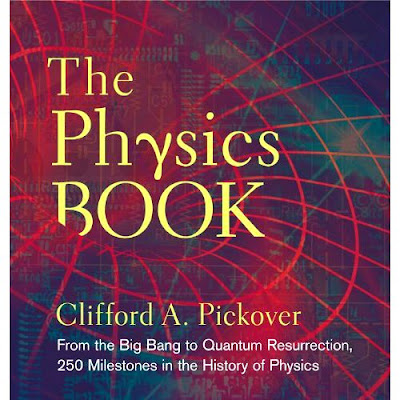Clifford Pickover has a followup to his excellent The Math Book, titled The Physics Book. Union College professor and laser cooling specialist Chad Orzel reviews it here and Pickover's own page describes it here.
Pickover's Math Book is one of five I strongly recommend for the budding genius in your family be they 8-80 or beyond:
These are IMO the five best introductory books to Mathematics that prove that the field IS ANYTHING BUT BORING, but is indeed a beautiful and exciting Field of Study.
State regulations in America's States, exceedingly boring in themselves, hamper our Teachers in making the students understand this VERY important subject. Math is overly tested here in the USA, and at too early an age, to the point of impressing our young and oh so important citizens that the subject seems positively evil, and useless.
"What is Math good for?" the childrens cry! This mantra is far too common. We. Must. Debunk.
Well, here are five books that will hopefully dispel that faulty thinking.
I list them from simplest to deepest, so this is the order in which I would recommend them to be read, with links to Amazon:
1) 50 Mathematical Ideas You Really Need To Know by Tony Crilly
Back on Feb. 8, 2010, I did a positive review of this book, outlining it even, twice, which you can call up by clicking here.
There are wonderful little timelines at the bottom of each of the 50 four-page chapters. I spent a considerable amount of time typing them in into a gross History of Mathematics at the very beginning of this year 2011, and you can call that up by clicking here.
This book is wonderfully cheap, and oddly, actually costs less at a local bookstore than at Amazon. I don't recommend this book for everyone. Only those aged eight to eighty. :-)
Mathematics starts here. This is your launching pad.
2) The MαTH βOOK: From Pythagoras to the 57th Dimension, 250 Milestones in the History of Mathematics by Clifford A. Pickover
Anyone who doesn't think that Math is beautiful, hasn't read this book. Heck, just skim through the pages. I would be surprised if you didn't buy it, just to own it. Beautiful pictures, suitable for framing. Beautiful prose.
3) Mathematics 1001: Absolutely Everything That Matters About Mathematics in 1001 Bite-Sized Explanations by Richard Elwes
You've seen 50 Mathematical ideas, then 250 milestones. Time to ratchet up the Knowledge Quotient. Try 1001. Currently my favorite read and my launching pad for ideas when I'm bored. And I hate being bored. I've got a fever, and the only prescription during those times is this book. Or more cowbell. Both'll work.
Dr. Elwes has a webpage for this book, including the very small amount of errata, which can be found here.
John Baez has a nice recent review of the book: here.
4) Euler's Gem: The Polyhedron Formula and the Birth of Topology by Dave Richeson
There's more to Topology than mathematicians being unable to distinguish a coffee cup from a donut, unlike policemen, who don't care; they enjoy both. This is the first of these books that have actual EQUATIONS in them, but don't freak out. They're straightforward, and Dave expositates beautifully.
It's all about Leonhard Euler in oh so many ways. I can't recommend this book strongly enough.
5) The Princeton Companion to Mathematics edited by Timothy Gowers, et. al.
And now it's time for Grad School. Not every Mathematician knows what their fellows are up to. It's been said by a famous Mathematician, that if they were stranded on a desert island and could have only one book, it would be the Princeton Companion. Read it and you'll see why. It is superb.






3 comments:
I like these choices and would throw in 2 more selections, in case you're not aware of them, from a couple of the authors you've already cited:
"The Big Questions: Mathematics" by Tony Crilly
"Mathematics Without the Boring Bits" (has a different title in Britain) by Richard Elwes
Both are super intros to math for inquiring young (or young-at-heart) minds.
Thanks much, Shecky! Crilly and Elwes are amazing. Will check them out. ;-)
The GED is a proficiency examination that gives the certificate holder the opportunity to go to college or gain employment. Many individuals go through the process of preparing for and taking the GED in order to better themselves. This equivalency test is the key for many other opportunities that are inaccessible due to the lack of a high school diploma.
best ged book
Post a Comment